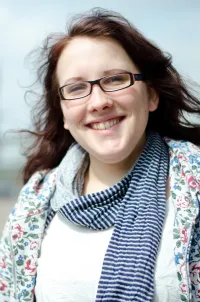
Debora Rahma is a second-year student of Gender Studies. She is pursuing the Master of Arts degree, 2-subject programme. Debora's other discipline is History.
What made you choose this degree programme?
|
Because I am interested in gender studies.
|
In which respect have or haven’t your expectations been fulfilled?
I was very worried that, as an outsider in this discipline, I might not be able to join in and that I might lack the necessary background knowledge. However, Gender Studies offers a sufficient number of seminars to accommodate students from different backgrounds, allowing them to catch up on the necessary expertise. I have always felt to be in good hands and only rarely to be a disciplinary outsider. Rather, the ambivalent make-up of the student group resulted in fruitful exchange in the seminars. In some cases, I was able to contribute the knowledge acquired in my other subject, History.
Which aspect of your degree programme do you enjoy most?
The exchange in the seminars, which routinely results in interesting discussions. I also like that we are frequently able to observe and apply the acquired knowledge in practice. The way I view society has changed. Now, I pay much more attention.
What has been your biggest challenge to date?
Applying for the degree programme. Those people who had experience in Gender Studies were very friendly and supportive, but the bureaucratic effort to enrol in the subject was, in my experience, very high. Mainly because of the rigid deadlines that did not allow any exceptions.
What would you like to become after completing your degree?
A precise job title does not as yet exist, but I think that I'd like to work at a university or municipal institution dealing with the issue of reconciling work and family life. I would like to both manage projects and provide consultancy. That would be the first step. My long-term plan is to take over managerial duties at an equal-opportunities office.
Which advice would you like to give to students who consider enrolling in this degree programme?
In the first step, you should ask yourself whether you are willing to catch up on theories. At the beginning, the degree course requires a lot of reading. And you should have a pronounced interest in gender-specific issues. A good thing about Gender Studies is that you interact a lot with other faculties! In addition to social science students, you will also collaborate with people studying media studies, German studies and even sport science. And you will naturally meet many nice people among your fellow students. Gender Studies is a small degree programme, it almost has a family-like atmosphere.


